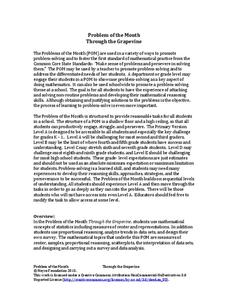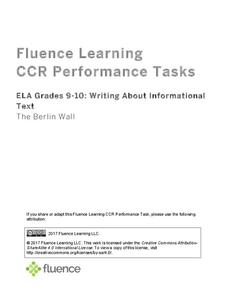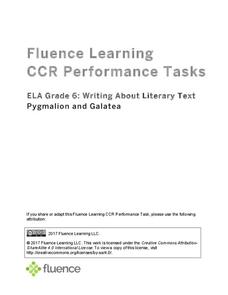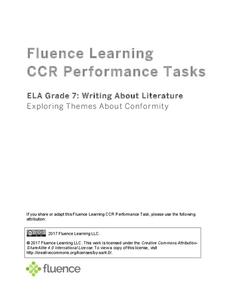Noyce Foundation
Through the Grapevine
Teach statistics by analyzing raisins. A thorough activity provides lesson resources for five levels to include all grades. Younger pupils work on counting and estimation, mid-level learners build on their understanding of the measures...
Noyce Foundation
Miles of Tiles
Create number sentences and equations to solve geometric problems. Each activity in the series of five asks young mathematicians to consider different-sized tiles to build structures according to specific criteria. The first activities,...
Noyce Foundation
Surrounded and Covered
What effect does changing the perimeter have on the area of a figure? The five problems in the resource explore this question at various grade levels. Elementary problems focus on the perimeter of rectangles and irregular figures with...
Noyce Foundation
Tri-Triangles
Develop an understanding of algebraic sequences through an exploration of patterns. Five leveled problems target grade levels from elementary through high school. Each problem asks young mathematicians to recognize a geometric pattern....
Noyce Foundation
Perfect Pair
What makes number pairs perfect? The resource provides five problems regarding perfect pairs of numbers, the definition of which changes in complexity with each task. Solutions require pupils to apply number sense and operations, as well...
Noyce Foundation
Cubism
If cubism were a religion, would you follow it? Lower-level tasks focus primarily on counting the number cubes in a structure and relating the number to surface area. As learners progress to higher-level tasks, isometric drawings and...
Noyce Foundation
Lyle's Triangles
Try five problems on triangles. Levels A and B focus on shapes that can be created from right triangles. Level C touches upon the relationship between the area of a six-pointed star and the area of each triangle of which it is composed....
Noyce Foundation
Piece it Together
Score some problems all related to soccer balls. The first few problems focus on pattern blocks to see relationships between figures. More advanced problems focus on actual soccer balls, the patterns on the balls, and their volumes and...
Noyce Foundation
Diminishing Return
Challenge individuals to compete as many tasks as possible. Lower-level tasks have pupils apply costs and rates to solve problems. Upper-level tasks add algebraic reasoning and conditional probability to the tasks.
Noyce Foundation
Double Down
Double the dog ears, double the fun. Five problems provide increasing challenges with non-linear growth. Topics include dog ears, family trees and population data, and geometric patterns.
EngageNY
Estimating Digits in a Quotient
Boiling down any division problem to a one-digit divisor problem sure makes estimation easy. The lesson shows how to estimate division problems by using place value understanding and basic arithmetic facts to simplify the division. Some...
California Education Partners
Miguel's Milkshakes
Moooove over, there's a better deal over there! The fourth segment in a series of eight requires individuals to determine the best unit cost for milk. Scholars calculate the least amount they can spend on a particular quantity of milk....
California Education Partners
T Shirts
Which deal is best? Learners determine which of two companies has the best deal for a particular number of shirts. They begin by creating a table and equations containing each company's pricing structure. Individuals finish the seventh...
Fluence Learning
Writing Informational Text: Lemonade Stand
Use a performance task to assess third graders' ability to read informational text. After they plan a lemonade stand business, young entrepreneurs implement that plan through informational writing. The task assumes learners can...
Fluence Learning
Writing About Literature Shakespeare and Plutarch
The Oscar for the Best Adapted Screenplay acknowledges a writer's excellence in adapting material found in another source. What do your class members know about adapted resources? Find out with an assessment that asks readers to compare...
Fluence Learning
Writing a Narrative: How Bear Lost His Tail
After reading the first, second, and third parts of "How Bear Lost His Tail", third grade writers answer questions about the story by completing a series of options, including discussion points. Then, they begin to plan a new narrative...
Fluence Learning
Writing About Informational Text The Berlin Wall
On June 26, 1963 President John F. Kennedy delivered his famous "Ich bin ein Berliner" speech close to the Berlin Wall at the Rudolph Wilde Platz. On June 12, 1987 President Ronald Reagan Delivered his famous "Mr. Gorbachev, tear down...
Fluence Learning
Writing About Literary Text: Pygmalion and Galatea
Is it crazy to fall in love with your own work, or is that the purest love of all? Compare two renditions of the classic Greek myth Pygmalion and Galatea with a literary analysis exercise. After students compare the similarities and...
Fluence Learning
Writing About Literature: What Is Happiness?
Jack London's heart for adventure has come to define the spirit of America and its frontier. Selected passages from the foreword The Cruise of the Snark take eighth graders through London's construction and voyage of his ship before...
Fluence Learning
Writing an Argument: Is Electronic Communication Helpful or Harmful?
Technology has undoubtedly improved the lives of people around the world—but has it improved communication? Seventh graders read two informative passages about the rise of texting and emailing versus in-person conversations before...
Fluence Learning
Divide Shapes
Let's partition rectangles into equal parts. Assess learners on their ability to divide shapes into equal parts, and their ability to explain their thinking.
Fluence Learning
Writing About Literature: Exploring Themes About Conformity
Feeling the pressure to confirm is something any adolescent can relate to. Explore an essential theme with a response to literature assessment that prompts learners to identify main ideas with evidence and supporting details.
Fluence Learning
Writing Informative Text: Did Shakespeare Write Shakespeare?
William Shakespeare penned some of the richest and most fascinating works of literature—or did he? Middle schoolers read three brief informative passages and conduct additional research to evaluate the claim that Shakespeare did not...
Fluence Learning
Writing About Informational Text: Beyond the Beyond—Galaxies
Everyone has a different point of view, even when it comes to the enormity of the universe. Two separate text passages explain the scope of a galaxy, prompting young readers to write an essay about each author's argument and how the...
Other popular searches
- Fitness Goals
- Academic Goals
- Career Goals
- Life Goals
- Educational Goals
- Health Goals
- Independent Reading Goals
- Long Term Educational Goals
- Goal Setting Lessons
- Student Goal Setting
- Educational Plans and Goals
- Goal Setting Worksheet

























